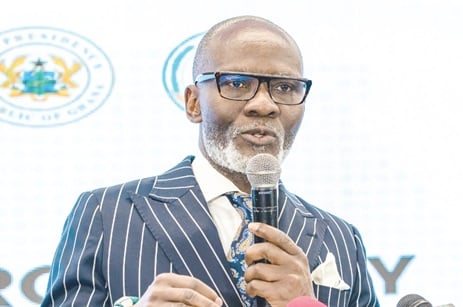Gabby Asare Otchere-Darko, a prominent figure within the New Patriotic Party (NPP), has linked the recent resurgence of the Ghana cedi to the Gold-for-Forex policy, a brainchild of former Vice President Dr. Mahamudu Bawumia. Otchere-Darko, who also founded the Danquah Institute, lauded the policy as a pioneering model currently being embraced by other African nations, citing Namibia as a recent example. This assertion comes amidst a period of recovery for the cedi, which had previously endured a protracted period of depreciation. Otchere-Darko’s comments, shared on social media, emphasized the policy’s contribution to Ghana’s currency stabilization and advocated for a united national front in supporting measures that bolster the country’s economic standing.
The Gold-for-Forex policy, as championed by Dr. Bawumia, involves using gold reserves to purchase foreign exchange, primarily US dollars. This mechanism aims to reduce reliance on traditional foreign exchange reserves, bolster the cedi’s value, and mitigate the impact of external shocks on the Ghanaian economy. By leveraging its gold reserves, Ghana can directly acquire the necessary foreign currency for international transactions, thereby lessening the pressure on the cedi and reducing its vulnerability to fluctuations in the global forex market. The adoption of this policy by other African countries, particularly Namibia, signals a growing recognition of its potential benefits for resource-rich nations seeking to stabilize their currencies and strengthen their economies.
Otchere-Darko’s endorsement of the policy comes against the backdrop of the cedi’s recent rebound. Data from Cedirates.com indicates a significant improvement in the cedi’s exchange rate against the US dollar, trading at a buying rate of GHS12.21 and a selling rate of GHS13.00 as of May 17, 2025. This represents a notable recovery from earlier periods of decline, signaling a potential turning point for the Ghanaian currency. Otchere-Darko’s comments, while celebratory, also reflect a cautious optimism, expressing hope that the cedi’s recovery is sustained rather than being a transient fluctuation.
His remarks also address past criticisms he faced for highlighting positive trends in the cedi’s performance, particularly in the lead-up to the 2024 general elections. The often-politicized nature of economic discourse can lead to skepticism and accusations of partisan motivations when positive developments are reported, especially during election cycles. Otchere-Darko’s reference to these past criticisms underscores the challenges of maintaining objective economic analysis in a highly charged political environment. He emphasized his genuine desire for the cedi’s continued strength and stability, regardless of political affiliations.
Central to Otchere-Darko’s message is a call for national unity in addressing economic challenges. He urges political actors to prioritize national interests over partisan agendas, advocating for a collaborative approach to policymaking. He criticizes the tendency to exploit economic difficulties for political gain, arguing that such behavior undermines the collective effort needed to achieve sustained economic progress. He emphasizes the importance of supporting policies that benefit the nation as a whole, irrespective of political affiliations.
This call for unity echoes a broader sentiment within the Ghanaian political landscape: the need for a more collaborative and less adversarial approach to national development. The focus, he argues, should be on solutions that strengthen the economy and improve the lives of all Ghanaians. This transcends party lines, as a strong economy ultimately benefits everyone, regardless of their political persuasion. By working together and putting the national interest first, Ghana can achieve greater economic stability and prosperity, furthering its development goals and securing a brighter future for all its citizens.














